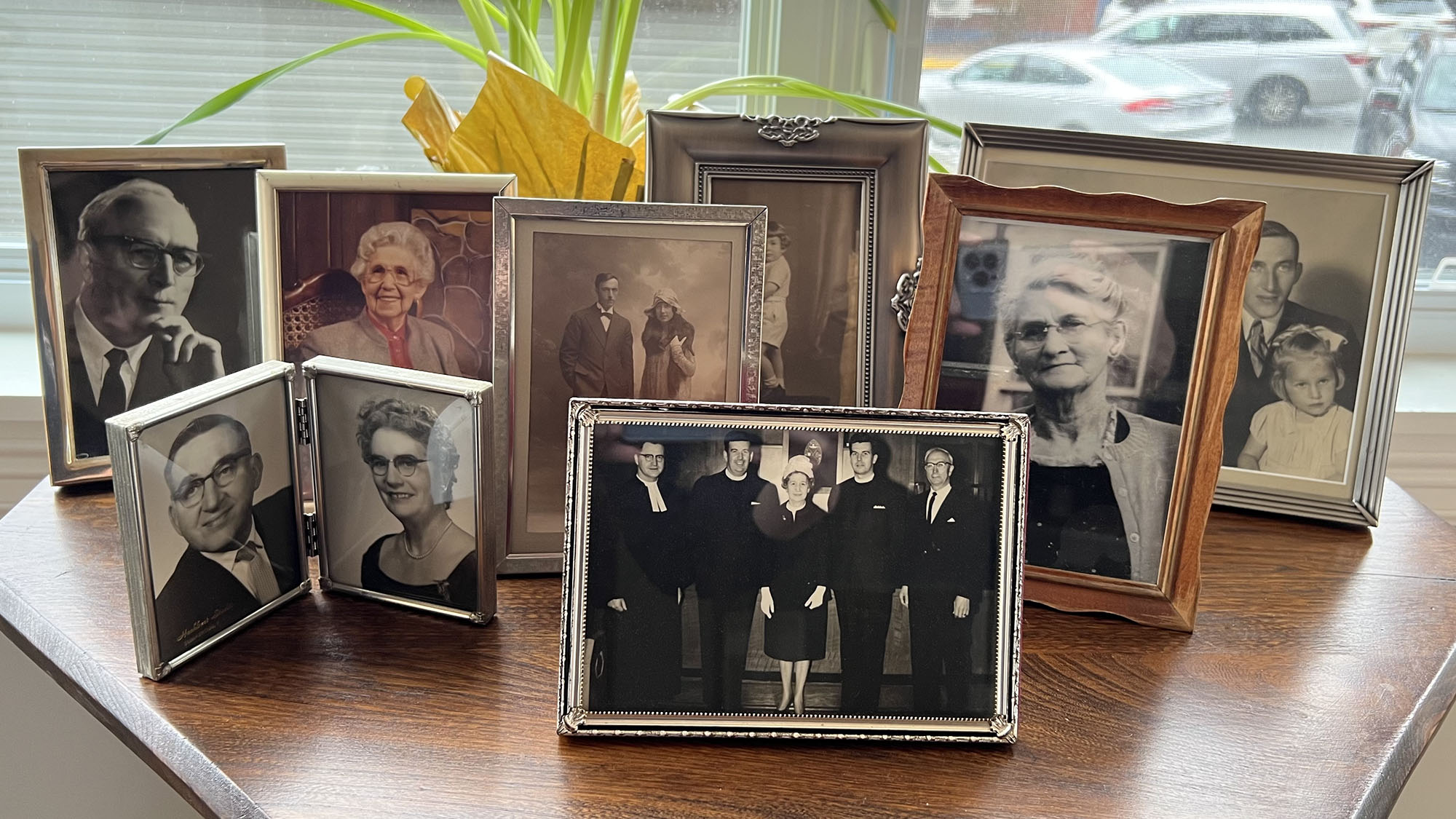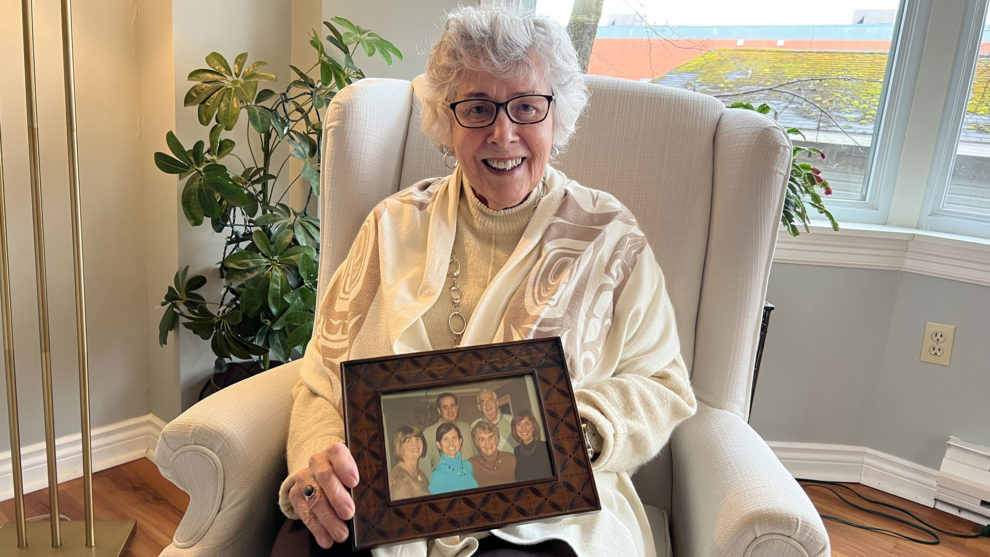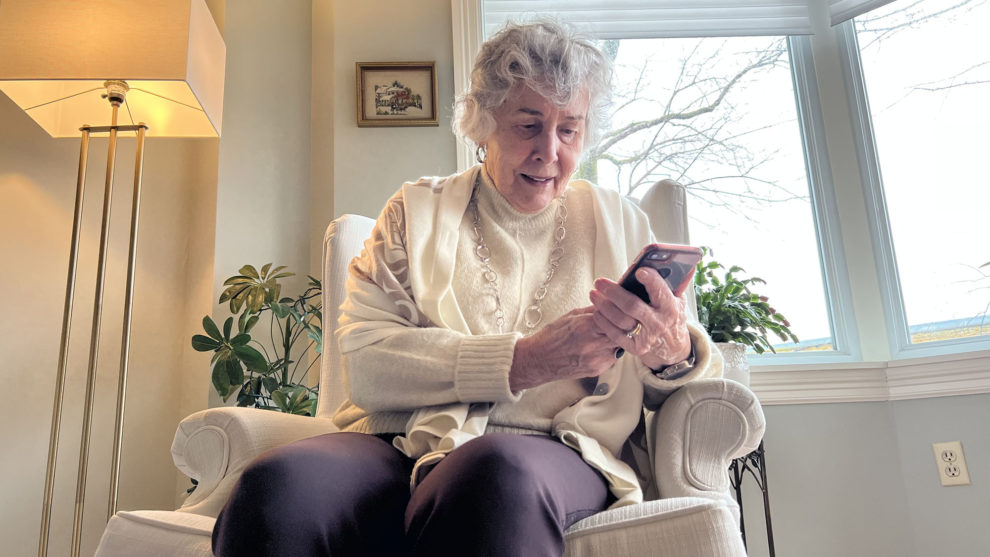Why older generations are staying quiet on mental health

caption
Photos of Ella Roberts' family members sit on a table in her living her roomStigma. Ageism. Fear. The challenges are formidable.
The landline rings for at least the tenth time today in Ella Roberts’ apartment. She knows exactly who it is. It’s Olivia, the perpetrator of a scam that targets older people like Roberts.
Despite the annoying ring piercing the silence of her apartment, Roberts is a force of positivity and kindness. She’s a strong woman, a self-described optimist who puts you at ease the moment you meet her.
After losing the love of her life, Bruce, to cancer 15 years ago, she now, at 89, lives alone in her apartment in South-End Halifax. Though she isn’t rich, she describes her life as full of privilege, thanks in large part to her strong family support network. With four kids, 13 grandchildren and five great-grandchildren who love her dearly, she doesn’t know what else she could ask for.

caption
Ella Roberts with a photo of herself, her late husband Bruce, and their four kids.There’s no better testament to Roberts’ strong will in the face of adversity than the winter of 2023. In the span of just three weeks, she’s received devastating news about the health of two family members. Still, she finds a way to flash her smile. “We’re not guaranteed tomorrow,” she says, “so I live life like there’s no tomorrow.”
Roberts’ life hasn’t always been sunshine and rainbows. She watched as her first-born daughter’s life was cut short at 4 years old. She has struggled through severe financial troubles. And had Bruce pass away beside her.
In the late 1960s she reached her breaking point. After a visa application was denied for a missionary trip to India, leaving her family without a clear direction, she began to have breakdowns. She would often lock herself in the bathroom to cry or take out her frustrations on the person she loved the most, Bruce.
Feeling both mentally and physically ill, she questioned if her breakdowns might even be caused by cancer. Roberts decided to seek treatment and was referred to a psychiatrist, Dr. Leon.
In 1968, she spent six months, from January to June, working with the psychiatrist. She says that Dr. Leon didn’t jump right to giving her medication to calm her breakdowns. Instead, he took time to get to the crux of her issues.
Before the sessions with Dr. Leon, Roberts says she felt like she had to get everything done around the house. This would often make her late when going out, causing stress for both her and her marriage. She says that she learned it’s okay to not have everything done before going out. Now, she doesn’t even think twice about it. “The good advice he gave me, helped me the rest of my life.”
Roberts is aware that not everyone, especially people her age, can say that their mental health was greatly improved by working with a psychiatrist. She wishes that more people her age would seek help when they need it. “If you’re mentally upset, and feel like life is not worth living,” she says, “you can get help.”
In the media we hear a lot about the mental health of young adults, but rarely anything about seniors. That doesn’t mean they aren’t suffering. According to the Suicide Prevention Resource Center (S.P.R.C.), the U.S.’s only federally supported organization for preventing suicide, men aged 85-89 have the highest rate of suicide in the country.
The head of geriatric psychiatry for the Nova Scotia Health Authority, Dr. Mark Bosma, says seniors face extra risks for certain types of mental health problems. He notes that dementia, a general term for diseases that impair cognitive function, is most prevalent amongst seniors, and people who develop dementia are at a higher risk for depression, anxiety and psychosis. Additionally, various illnesses can mean a loss of independence – which can result in mental health challenges.
According to the Mental Health Commission of Canada, the burdens that some seniors face can lead to an increase in suicidal thoughts. The loss of loved ones, change in financial status and transition to assisted living homes can all result in increased strain to their mental health.
The Public Health Agency of Canada says that men over 85 have the third-highest rate of suicide in the country. people. (Highest, in the latest, 2019 data, are men between 50-64.)
According to the Mental Health Commission of Canada, people 65 and over have a high risk of suicide, and of every three attempts one results in death (compared to 1 in 200 suicide attempts by youth.) There are a number of reasons why. Seniors, especially those who live alone, are less likely to be discovered committing an attempt. They tend to use more deadly methods. And because they are old, they are less likely to survive an attempt.
Generational stigma
Today’s youth grow up with some dialogue around mental health; older generations – if mental health was spoken of at all – were largely taught to deal with it in private. Many still hold onto this today. Stigma makes it hard for many seniors to acknowledge symptoms of depression or anxiety.
Roberts, like many seniors, has faced mental health stigma. She had her husband drop her off to appointments with Dr. Leon, and she would then take the bus back home. She recalls how nervous she felt on the bus ride back. If anyone she knew saw her coming from the psychiatry clinic, she’d be mortified. She didn’t even want to tell her own mother; no one in her family had ever dealt with mental health problems.
Yet the more treatment she got, the more comfortable she felt talking about her mental health challenges, and the easier the bus rides became. “By the end of the six months,” she says, “I wanted to show the world where I was coming from.”
Since then she’s been able to talk about her mental health challenges with grace. Fortunately, her breakdowns never returned. If they did, she says, she’d feel comfortable turning to a mental health professional.
The stigma, unfortunately, is still terribly present for most seniors. Dr. Bosma says that because of the ever-present stigma, seniors are hesitant to bring forward and report their symptoms. This can make it difficult for statistics to paint the full picture of how seniors are doing.
Psychologist Michael Monette’s paper Senior suicide: an overlooked problem, published in the Canadian Medical Association Journal in 2012, said that identifying seniors in need of mental health help is an issue. This is because most seniors are hesitant to talk about their mental health challenges.
“I’m not a loner. Even though I’m alone a lot.”
Ella roberts
Statistics Canada shows that between November of 2021 and February of 2022, 37.5 per cent of surveyed Canadians aged 12 and over reported that their mental health was somewhat worse or much worse than prior to the pandemic. Only 22.5 per cent of Canadians 65 or over reported the same. This stat likely doesn’t accurately portray how seniors feel.
Seniors accounted for a majority of deaths in the pandemic. As one of the most vulnerable populations, seniors often took extra precautions. Dr. Bosma says the loneliness and isolation felt as a result of restrictions might have put seniors at risk for mental health challenges. “One of the things that really contributes to seniors having mental health and good functioning is social connectedness or connectivity. And that was really lost.”
Roberts says that without her social life, she wouldn’t be nearly as happy. “I’m a social person. I need friends,” she says. “I’m not a loner, even though I’m alone a lot.”
The bite of ageism
Ageism is an unfortunate reality for many seniors. Dr. Bosma says family physicians are more apt to take on younger patients, who tend to have less complex medical issues. He also says there’s a belief that it’s normal to have mental health challenges as we age. This sentiment is echoed in Monette’s paper. Seniors who display signs of mental health challenges often don’t get them addressed – because of this false belief.
Those with dementia face even more difficulties. Dr. Bosma says that hospitals are hesitant to take in older patients with dementia that can no longer be cared for at home. Hospitals fear that, in a system already struggling with a lack of free beds, a patient with nowhere to return may take up a bed for a long period of time.
This means that more focus needs to be put on continuous care and homecare services. Dr. Bosma says that in his experience there aren’t enough resources for it to be successful just yet. There just are not enough homecare workers to support what is currently needed.
In December 2021, the Government of Nova Scotia announced a $57 million investment in training and retaining continuous care workers. Of that money, $22 million will cover the full tuition costs of 2,000 students in continuous care assistant programs. Dr. Bosma says it will likely be three years until the effects are noticed.

caption
Ella Roberts discovers that the Wordle of the day is: heady.The Mental Health Commission of Canada says that an important first step to helping a struggling senior, if you see any concerning changes in their behaviour, is to mention it. If the senior’s response suggests feelings of depression, directly asking if they have been contemplating suicide might help to prevent it.
Dr. Bosma says that if a senior in your life is showing signs of mental health struggles, the best thing you can do is bring them to a family practitioner. Family doctors are able to refer seniors to a geriatric psychiatrist, someone specifically trained to help older people.
On a day-to-day level you personally can help seniors. By simply checking in on a senior in your life, you’re often giving them much needed socialization. In addition to her book club and exercise group, Roberts often gets phone calls from her family, something that brightens her day.
Back at Roberts’ apartment, the phone rings again. It’s been only 10 minutes since it last rang. She shoots a sharp look in the direction of her landline. She knows exactly who it is. Olivia.
Except what if it’s not. For a brief second, she doubts herself. After all, it could be a friend or family member calling with important news. She gets up from her chair and shuffles to the kitchen. The number reveals it is Olivia — she’s been relentless this afternoon.
With a head shake, the normally jovial Roberts turns and comes back to her chair. She sits down and sighs. “Go home, Olivia.”
About the author

Jack Ronahan
Jack is a fourth year journalism student at the University of King's College.
